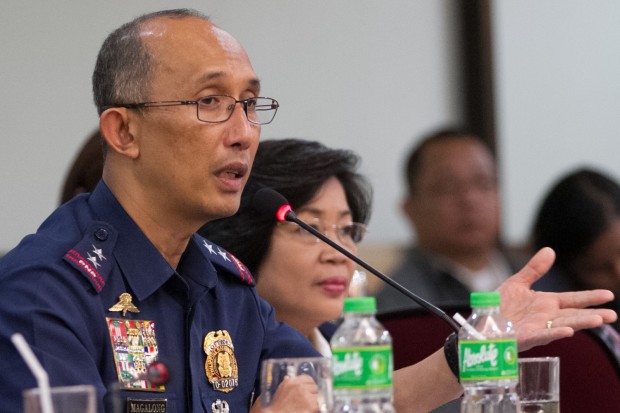Police kept out of raid, says high PNP official

LEFT OUT Police Director BenjaminMagalong complains that the Criminal Investigation and Detection Group was left out of the Bilibid raid, but says the operation was successful. ALEXIS CORPUS
A Philippine National Police official on Wednesday told a congressional inquiry that the Criminal Investigation and Detection Group (CIDG) developed a plan to bust the illegal drug trade in New Bilibid Prison (NBP), but was left out in the cold when the Department of Justice (DOJ), then headed by Secretary Leila de Lima, carried it out.
Director Benjamin Magalong, deputy PNP chief for operations and former CIDG head, told the House hearing on the proliferation of drugs in NBP that he and his men developed “Oplan: Cronus” based on intelligence information he had received from his assets at the national penitentiary.
Magalong said De Lima, now a senator, was aware of Cronus but he was surprised when the DOJ and the National Bureau of Investigation suddenly raided NBP on Dec. 15, 2014, without the CIDG and the Philippine Drug Enforcement Agency (PDEA).
Justice Secretary Vitaliano Aguirre II said Magalong’s testimony “bolsters” the case he wanted to file against De Lima, who was ousted as chair of the Senate committee on justice and human rights on Monday for trying to establish a link between the vigilante killings in Davao City when President Duterte was still its mayor and the extrajudicial killings in Mr. Duterte’s brutal war on drugs.
But Cebu City Rep. Rodrigo Abellanosa raised concern that the DOJ, in its effort to help President Duterte in his war against drugs, might also be helping him in his own “war against De Lima.”
Article continues after this advertisement“I believe that the present DOJ is very sincere in its effort to help the President in the war against drugs. But we are afraid that the initial efforts right now, (with) the information you are sharing with this committee, I am afraid that you are also helping the President in his war against De Lima,” Abellanosa said.
Article continues after this advertisementHe said all the affidavits of the NBP inmates presented by the DOJ during the committee investigation linked De Lima one way or another to the drug trade in the national penitentiary.
“This committee might be missing out on the chance to truly find out how the drug trade works and thrives inside the national penitentiary because of the focus on De Lima,” he said.
He pointed out that convicted kidnapper Rodolfo Magleo claimed in his affidavit that the maximum security compound at NBP had been turned into the “drug trade center of the Philippines” because its operations covered Luzon, Visayas and Mindanao and that it was run by foreign and local drug lords serving sentences at the national penitentiary.
One drug lord, Peter Co, made a profit of P1 billion in 2012, Magleo said in his affidavit.
But Abellanosa said he noticed that instead of expounding on this detail, Magleo suddenly deviated to say how he met De Lima and her driver, Ronnie Dayan, in 2011.
Broader perspective
Abellanosa said the committee should “bring in witnesses outside the initiative of the DOJ so that we can have a broader perspective of what really happened at [Bilibid]” in relation to the drug trade.
If De Lima was the “cause of it all,” Abellanosa asked Aguirre whether the drug trade in NBP had been eradicated now that she was out and he had taken over.
“Or have we reached the point that we are constricted in the De Lima perspective? I am apprehensive that we will miss the point (of this investigation),” Abellanosa said.
Mindoro Rep. Reynaldo Umali, the justice committee chair, said at the start of the hearing that the investigation was not about De Lima but the proliferation of drugs at Bilibid.
‘Natural course’ of probe
Defending himself, Aguirre said the DOJ was not “pointing at any personality” in the investigation and that if the affidavits eventually named De Lima, it was because it was the natural course of the investigation.
Aguirre said he did not have a hand in the testimony of the witnesses, adding he saw and heard two of them only on Wednesday. He did not name who these witnesses were.
But before Abellanosa questioned him, Aguirre was confident that Magalong’s testimony would help him build an airtight case against De Lima.
“With the testimony of [Director] Magalong, the strength of our case was more than doubled. We will request the CIDG, specifically Magalong, and the specific officer of the PDEA who will prove the [Bureau of Corrections] only asked for canines for affidavits,” Aguirre said.
He stressed that Magalong’s testimony would show that the December 2014 raid on Bilibid led by De Lima was “merely a show on the part of the DOJ.”
“As of this point, we could begin the prosecution of those involved,” Aguirre said.
Raid a ‘success’
Magalong said that while he felt bad that the CIDG was shut out of the December raid, he considered it a “success” because contraband and weapons were found and confiscated, and the convicts involved in the drug trade were identified.
But Magalong said one inmate whom the CIDG wanted to isolate was not included in the so-called Bilibid 19—the drug convicts who were transferred temporarily to the NBI.
He did not name the convict.
Magalong said it was then BuCor chief Franklin Bucayo and then Presidential Anti-Organized Crime Commission head Reginald Villasanta who knew about the December 2014 raid.
He added that earlier during the planning and meetings for the raid, he volunteered to be the ground commander because no one wanted to take on the role.